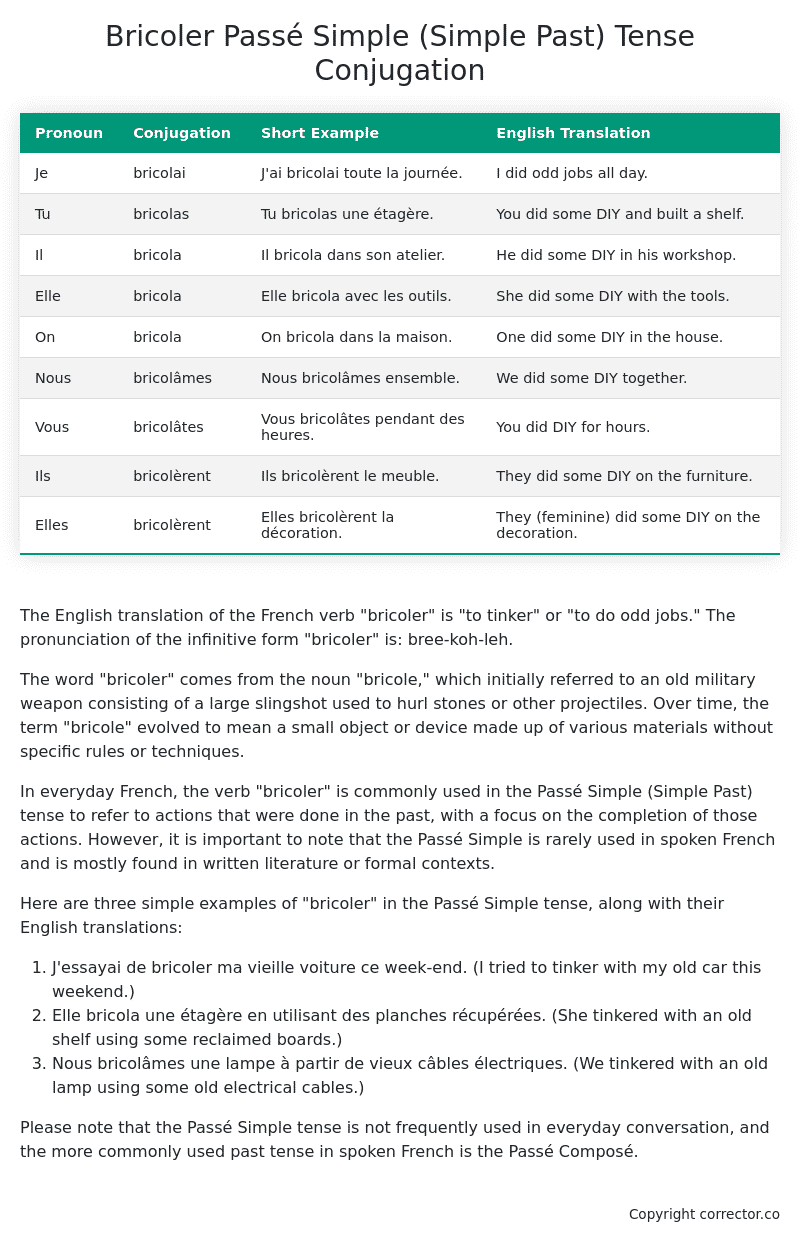Passé Simple (Simple Past) Tense Conjugation of the French Verb bricoler
Introduction to the verb bricoler
The English translation of the French verb “bricoler” is “to tinker” or “to do odd jobs.” The pronunciation of the infinitive form “bricoler” is: bree-koh-leh.
The word “bricoler” comes from the noun “bricole,” which initially referred to an old military weapon consisting of a large slingshot used to hurl stones or other projectiles. Over time, the term “bricole” evolved to mean a small object or device made up of various materials without specific rules or techniques.
In everyday French, the verb “bricoler” is commonly used in the Passé Simple (Simple Past) tense to refer to actions that were done in the past, with a focus on the completion of those actions. However, it is important to note that the Passé Simple is rarely used in spoken French and is mostly found in written literature or formal contexts.
Here are three simple examples of “bricoler” in the Passé Simple tense, along with their English translations:
- J’essayai de bricoler ma vieille voiture ce week-end. (I tried to tinker with my old car this weekend.)
- Elle bricola une étagère en utilisant des planches récupérées. (She tinkered with an old shelf using some reclaimed boards.)
- Nous bricolâmes une lampe à partir de vieux câbles électriques. (We tinkered with an old lamp using some old electrical cables.)
Please note that the Passé Simple tense is not frequently used in everyday conversation, and the more commonly used past tense in spoken French is the Passé Composé.
Table of the Passé Simple (Simple Past) Tense Conjugation of bricoler
| Pronoun | Conjugation | Short Example | English Translation |
|---|---|---|---|
| Je | bricolai | J’ai bricolai toute la journée. | I did odd jobs all day. |
| Tu | bricolas | Tu bricolas une étagère. | You did some DIY and built a shelf. |
| Il | bricola | Il bricola dans son atelier. | He did some DIY in his workshop. |
| Elle | bricola | Elle bricola avec les outils. | She did some DIY with the tools. |
| On | bricola | On bricola dans la maison. | One did some DIY in the house. |
| Nous | bricolâmes | Nous bricolâmes ensemble. | We did some DIY together. |
| Vous | bricolâtes | Vous bricolâtes pendant des heures. | You did DIY for hours. |
| Ils | bricolèrent | Ils bricolèrent le meuble. | They did some DIY on the furniture. |
| Elles | bricolèrent | Elles bricolèrent la décoration. | They (feminine) did some DIY on the decoration. |
Other Conjugations for Bricoler.
Le Present (Present Tense) Conjugation of the French Verb bricoler
Imparfait (Imperfect) Tense Conjugation of the French Verb bricoler
Passé Simple (Simple Past) Tense Conjugation of the French Verb bricoler (You’re reading it right now!)
Passé Composé (Present Perfect) Tense Conjugation of the French Verb bricoler
Futur Simple (Simple Future) Tense Conjugation of the French Verb bricoler
Futur Proche (Near Future) Tense Conjugation of the French Verb bricoler
Plus-que-parfait (Pluperfect) Tense Conjugation of the French Verb bricoler
Passé Antérieur (Past Anterior) Tense Conjugation of the French Verb bricoler
Futur Antérieur (Future Anterior) Tense Conjugation of the French Verb bricoler
Subjonctif Présent (Subjunctive Present) Tense Conjugation of the French Verb bricoler
Subjonctif Passé (Subjunctive Past) Tense Conjugation of the French Verb bricoler
Subjonctif Imparfait (Subjunctive Imperfect) Tense Conjugation of the French Verb bricoler
Subjonctif Plus-que-parfait (Subjunctive Pluperfect) Tense Conjugation of the French Verb bricoler
Conditionnel Présent (Conditional Present) Tense Conjugation of the French Verb bricoler
Conditionnel Passé (Conditional Past) Tense Conjugation of the French Verb bricoler
Conditionnel Passé II (Conditional Past II) Tense Conjugation of the French Verb bricoler
L’impératif Présent (Imperative Present) Tense Conjugation of the French Verb bricoler
L’impératif Passé (Imperative Past) Tense Conjugation of the French Verb bricoler
L’infinitif Présent (Infinitive Present) Tense Conjugation of the French Verb bricoler
L’infinitif Passé (Infinitive Past) Tense Conjugation of the French Verb bricoler
Le Participe Présent (Present Participle) Tense Conjugation of the French Verb bricoler
Le Participe Passé (Past Participle) Tense Conjugation of the French Verb bricoler
Struggling with French verbs or the language in general? Why not use our free French Grammar Checker – no registration required!
Get a FREE Download Study Sheet of this Conjugation 🔥
Simply right click the image below, click “save image” and get your free reference for the bricoler Passé Simple tense conjugation!

Bricoler – About the French Passé Simple (Simple Past) Tense
Formation
Usage
Narration
Historical Context
Interactions with other tenses
Passé Composé
Imparfait
Conditional and Subjunctive
Summary
I hope you enjoyed this article on the verb bricoler. Still in a learning mood? Check out another TOTALLY random French verb conjugation!


